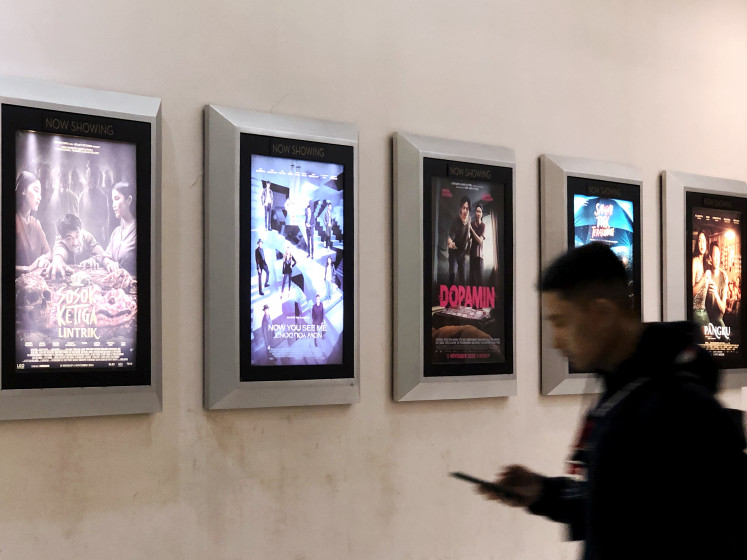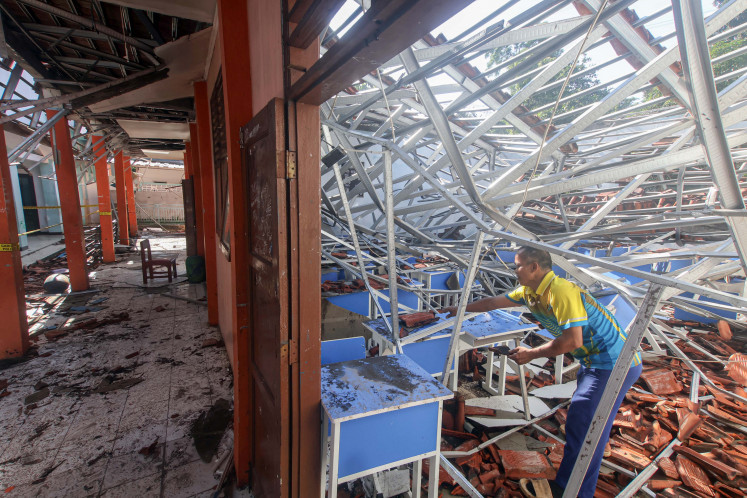Popular Reads
Top Results
Can't find what you're looking for?
View all search resultsPopular Reads
Top Results
Can't find what you're looking for?
View all search resultsRI faces challenges engaging with Middle East
For Indonesia, the world’s largest Muslim-majority country, strong political ties with the Middle East do not always translate into solid economic partnerships
Change text size
Gift Premium Articles
to Anyone
F
or Indonesia, the world’s largest Muslim-majority country, strong political ties with the Middle East do not always translate into solid economic partnerships.
As President Joko “Jokowi” Widodo’s special envoy to the Middle East, former foreign minister Alwi Shihab has been leading efforts to map out Indonesia’s economic opportunities in this region, including hosting discussions and business-matching events.
He recently said that the President had expressed a desire to secure more fresh funds from the Middle East, but investors somehow always ended up comparing Indonesia’s business climate to that of regional rivals such as Malaysia and Vietnam.
“There are things that they see are easier [elsewhere],” Alwi said on the margins of a conference on boosting investments to members of the Organization for Islamic Cooperation (OIC) last week. “So far Indonesia has always tried to see what privileges our neighboring countries have given, and strive to be more competitive so people can come here.”
Indonesia slipped one spot to place 73rd on the World Bank’s Ease of Doing Business Index published in 2018, complicating the national target to break into the top 40 this year. In comparison, Malaysia ranks 15th and Vietnam 69th.
Licensing and taxation problems have been some of the biggest complaints, making it hard for existing and potential investors to justify the costs and time they have to bear in Indonesia.
Abdullah Al-Shoraian Al-Mutairi, acting country manager of the Kuwait Foreign Petroleum Exploration Company, said investors hoped for more fiscal incentives in a number of new cooperation schemes, as well as more centralized information from the government.
"We also hope that various bureaucratic steps can be reduced," Al-Mutairi said, lamenting the fact that red tape had resulted in lots of wasted time and resources for Middle Eastern investors.
Among the Arab countries and OIC member states, Indonesia enjoys historically close bonds and is growing its political clout by pushing the narrative of a moderate and tolerant Islam to counter the global spread of violent extremism.
It recently managed to persuade Saudi Arabia to relax visa requirements for haj pilgrims and got Riyadh to dole out compensation for a fatal construction crane accident that occurred four years ago.
In terms of business, however, foreign direct investment from the Middle East and the OIC amounts to just US$471 million, making up less than 1 percent of the total $162 billion received over the past five years, according to Investment Coordinating Board (BKPM) data.
This has on more than one occasion irked the President.
In 2017, one month after the visit of Saudi King Salman bin Abdulaziz Al-Saud to Indonesia, Jokowi publicly made a fuss about Riyadh’s meager investment commitment to Indonesia, particularly after the President went to lengths to win the king’s heart.
Saudi Arabia is ranked 40th on the list of Indonesia’s sources for realized foreign investments with just $5.3 million invested in 2018, according to BKPM.
In order to overturn this poor showing, BKPM acting deputy for investment oversight Farah R. Indriani said the President had instructed all the relevant ministries to send a special delegation to the region every three months.
Coordinating Maritime Affairs Luhut Pandjaitan, for example, was in Abu Dhabi this week to follow up on a plan to establish a sovereign wealth fund that would allow the countries like the United Arab Emirates to pool resources for future infrastructure projects in Indonesia.
BKPM itself had established a special commission to serve potential investors from the Middle East and the OIC.
The government stepped up engagement with countries from the region in a flurry of diplomatic visits and lobbying that has intensified in the past few weeks.
Foreign Minister Retno LP Marsudi visited Bahrain and Kuwait earlier this month, and also hosted the secretary-general of the Gulf Cooperation Council of the Arab States, Abdul Latif bin Rashid Al-Zayani, and Iranian Foreign Minister Javad Zarif in Jakarta on separate occasions.
The President himself went to Saudi Arabia in April on a visit that focused primarily on economic cooperation, particularly in the energy and tourism sectors. In addition to meeting King Salman and Crown Prince Muhammad bin Salman, Jokowi also held talks with then-minister for energy, industry and mineral resources Khalid Al-Falih to discuss investments of state-owned Saudi Arabian Oil Co. (Aramco) in a refinery project in Cilacap, Central Java.
The push comes amid wider efforts to tap into nontraditional markets such as Africa, South Asia, Eastern Europe and Latin America, ushered on by a heated trade war between the United States and China that economists say has caused a slump in Southeast Asian exports.
The government has set a target of 5.3 percent economic growth for the next year on the promise of greater support for export financing and exploring new markets for trade and investment.
“The President believes there is no way to increase our growth except through foreign investment,” Alwi said.
But even with a major push in economic relations, the nation still struggles to wean itself from a long-term reliance on sending migrant labor to the region.
For a long time, Indonesia’s standing vis-à-vis Middle Eastern countries has not been seen as equal, especially with Saudi Arabia, with whom it still does not have a strategic partnership, said Yon Machmudi, a Middle East expert from the University of Indonesia.
“Many Indonesians — both diplomats and [members of the] diaspora communities — have complained that Saudi Arabia's view of Indonesia in social interactions was somewhat degrading because they still identified Indonesia as a source [of] informal workers,” he said recently.
However, Indonesia’s growing economy and its bigger role on the international stage, including in issues like the Afghan peace process, might just be enough to turn heads in the Middle East, experts say. (tjs)










